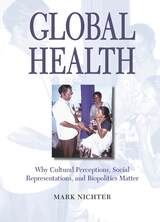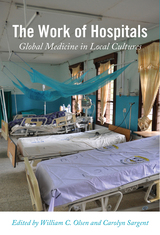2 books by Nichter, Mark

Global Health
Why Cultural Perceptions, Social Representations, and Biopolitics Matter
Mark Nichter
University of Arizona Press, 2008
In this lesson-packed book, Mark Nichter, one of the world’s leading medical anthropologists, summarizes what more than a quarter-century of health social science research has contributed to international health and elucidates what social science research can contribute to global health and the study of biopolitics in the future. Nichter focuses on our cultural understanding of infectious and vector-borne diseases, how they are understood locally, and how various populations respond to public health interventions.
The book examines the perceptions of three groups whose points of view on illness, health care, and the politics of responsibility often differ and frequently conflict: local populations living in developing countries, public health practitioners working in international health, and health planners/policy makers. The book is written for both health social scientists working in the fields of international health and development and public health practitioners interested in learning practical lessons they can put to good use when engaging communities in participatory problem solving.
Global Health critically examines representations that frame international health discourse. It also addresses the politics of what is possible in a world compelled to work together to face emerging and re-emerging diseases, the control of health threats associated with political ecology and defective modernization, and the rise of new assemblages of people who share a sense of biosociality. The book proposes research priorities for a new program of health social science research. Nichter calls for greater involvement by social scientists in studies of global health and emphasizes how medical anthropologists in particular can better involve themselves as scholar activists.
The book examines the perceptions of three groups whose points of view on illness, health care, and the politics of responsibility often differ and frequently conflict: local populations living in developing countries, public health practitioners working in international health, and health planners/policy makers. The book is written for both health social scientists working in the fields of international health and development and public health practitioners interested in learning practical lessons they can put to good use when engaging communities in participatory problem solving.
Global Health critically examines representations that frame international health discourse. It also addresses the politics of what is possible in a world compelled to work together to face emerging and re-emerging diseases, the control of health threats associated with political ecology and defective modernization, and the rise of new assemblages of people who share a sense of biosociality. The book proposes research priorities for a new program of health social science research. Nichter calls for greater involvement by social scientists in studies of global health and emphasizes how medical anthropologists in particular can better involve themselves as scholar activists.
[more]

The Work of Hospitals
Global Medicine in Local Cultures
William C. Olsen
Rutgers University Press, 2022
In the context of neoliberalism and global austerity measures, health care institutions around the world confront numerous challenges in attempting to meet the needs of local populations. Examples from Africa (including, Ethiopia, Ghana, and Congo), Latin America (Peru, Mexico, Guatemala), Western Europe (France, Greece), and the United States illustrate how hospitals play a significant role in the social production of health and disease in the communities where they are. Many low-resource countries have experienced increasing privatization and dysfunction of public sector institutions such as hospitals, and growing withdrawal of funding for non-profit organizations. Underlying the chapters in The Work of Hospitals is a fundamental question: how do hospitals function lacking the medications, equipment and technologies, and personnel normally assumed to be necessary? This collection of ethnographies demonstrates how hospital administrators, clinicians, and other staff in hospitals around the world confront innumerable risks in their commitment to deliver health care, including civil unrest, widespread poverty, endemic and epidemic disease, and supply chain instability. Ultimately, The Work of Hospitals documents a vast gulf between the idealized mission of the hospital and the implementation of this mission in everyday practice. Hospitals thus become “contested space” between policy and practice.
[more]
READERS
Browse our collection.
PUBLISHERS
See BiblioVault's publisher services.
STUDENT SERVICES
Files for college accessibility offices.
UChicago Accessibility Resources
home | accessibility | search | about | contact us
BiblioVault ® 2001 - 2024
The University of Chicago Press









